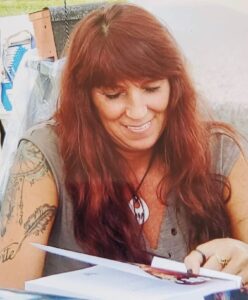
A reader took this pic as I signed her book.
Is there a right way and wrong way to sign a book?
Some authors claim you must sign the title page; others say you should sign the half-title page. Some authors cross out their printed name before signing; others consider it as defacing the book. Some authors only scrawl a signature; others personalize a message to the reader. Some authors include a date and location of the book signing; others don’t.
How can there be so much conflicting advice over signing a book?
I admit, I’d never heard of an author crossing out their name before conducting research for this post. I have more than a few shelves filled with signed editions, and none of the authors crossed out their printed name on the title page.
From where did this custom originate?
Authors seem split on the subject.
Some say the tradition started with personalized stationery. If you’re writing to a friend and your personalized stationery has your full name on it, crossing out the printed name suggests a more personal touch. Thus, an author crossing out their printed name on the title page suggests s/he is there in person to write his/her own name, so the signature supersedes the printed name.
Makes sense.
Others say the historic tradition dates back to the days of a small press run, where the author would hand-sign each book as an authentication of the text.
Also makes sense.
After all the blood, sweat, and tears I pour into each story, I would never cross out my name. I worked too hard to get it there in the first place. 😉 But it’s a personal choice. If you’re fond of tradition, then by all means cross out your name. Next, you’ll need to decide between one quick slanted line, a squiggly line, or a horizontal line drawn straight through the entire name.
To help you decide, read the comment section of Writer’s Digest.
What about adding a date and/or location?
Some say adding a date and/or location adds value for book collectors. Others say the author’s signature is most important. I’ve never added a date or location, but I like the idea of making it easy for the reader to remember when and where s/he met the author.
Personalization
I always ask if the reader wants the book personalized or just signed. I wish I could give you a definitive answer here, but the truth is, my audience is split on this issue. Half want a personalized message; the others are happy with a simple signature. As far as adding value, book collectors seem to agree that a lone signature is worth more than a personalization (aside from the date). That’s always been my impression, too, and one which I repeat to readers when I’m short on time.
“The book will be worth more with just a signature . . . when I’m dead.” 😉
When a line forms at the table, scrawling a lone signature makes life a lot simpler. Adding a date/location would only take a second, but that personalization can and will trip you up from time to time. Learned that lesson more than once. I donate the awkwardly signed paperbacks to my local library. It’s become a running joke.
“Hey, Sue. Book signing yesterday?”
“Yep.”
“Messed up a few?”
“Yep.”
“Excellent! See ya next time.”
Grumble, grumble. “See ya then.”
A few tips for personalization:
- Always ask readers to spell their name. Even common names can have unusual spellings. Example: Stacy, Stacie, Staci, Stacey. Last names? Forget about it. The possibilities are endless. Thankfully, most readers won’t ask you to include their last name.
- Before the event think of a few standard catch phrases for new readers. Bonus points if it relates to the book or series.
- Also jot down a few standard catch phrases for your dedicated fans. You don’t want to sign your tenth book with the same catch phrase you used for your debut. By creating a new one per event you’ll lessen the chances of disappointment. When in doubt, a simple “Thanks for your continued support” does the trick. It’s not all that creative, but it works in a pinch.
Sharpie, Colored Ink, or Classic Black?
Again, authors are split. Have you noticed a trend yet?
Some authors say they sign in colored ink to show the signature wasn’t preprinted in the book or done with a stamp. Others claim colored ink looks amateurish and an author should only sign in blue or black ink. And some authors always sign with a Sharpie.
I never sign with a Sharpie. When you’ve got a line at your table, it takes extra time to let the ink dry before closing the cover. Otherwise, the ink smudges. Blowing on the signature could speed up the process, but that’s never a good look. Sharpies also tend to bleed through to the next page.
If signing with a pen, bring more than one. At my last signing I ran through three. It’s a great problem to have, but a problem nonetheless if we forgot to pack more than one pen.
What Form of Payment to Accept?
At my first book signing, I wrongly assumed everyone would hand me dead presidents. Big mistake. I lost a lot of sales by only accepting cash and the occasional check from sweet ol’ cotton tops. Whether we like it or not, a whole generation uses cards or apps for everything they purchase. Including books.
Thankfully, we don’t need to lug around a manual credit card machine aka the “knuckle buster.” Nowadays all we need is a cell phone.
The top two easiest ways to accept cards are:
- Square Reader
- PayPal Zettle
The Square Reader is one of the best and most popular options. Compact, easy-to-use, and accepts all credit/debit card transactions. Either manually enter the credit/debit card, swipe the card through the reader attached to your cell phone, or hover the card over the reader for a contactless transaction. Square also accepts purchases via an app. Most purchases don’t require a signature. For those that do, the buyer scrawls a signature on your phone with their finger. Square has added benefits, too, like keeping a running tally of daily sales.
When you sign up for a Square account, you’ll be asked to link a bank account. Funds from the book signing will be deposited on the next business day. There’s also an option for instant transfer. The nice part about Square is the ability to set up your products in advance. When a reader purchases a book(s), tap the product(s) and Square automatically adds the price. Easy peasy. Square does offer a stand-alone terminal, but it’s pricey ($299. on Amazon).
PayPal Zettle is another great option. The Zettle 2 device is a stand-alone terminal. Connects wirelessly to PayPal’s Zettle Go App via Bluetooth and accepts all credit/debit cards, including Apple Pay, Venmo, Samsung Pay, Google Pay, and contactless transactions. The terminal costs $79, but new Zettle account holders only pay $29. Like Square, Zettle allows you to set up inventory and pricing. They also offer a mobile card reader.
I use both Square and the Zettle terminal. Dead zones abound in my area. Whichever device connects first is my favorite of the day. 😉
Group vs. Individual Signings
Group author events aren’t my favorite things to do. Some venues try to squeeze ten authors into a room that holds about five, and it’s a miserable experience for everyone. Aside from conferences, I don’t bother with group events anymore. That said, a signing with one or two other authors can be fun. Plus, if you’re new to book signings, having a fellow author to show you the ropes will help relieve some of the pressure. I will say, a solo signing is far more lucrative than a group event. Though it may depend on your area.
The Actual Signature
Early on in my career, I received top-notch advice from an author friend who had experience with book signings. She told me never to sign a book with my legal signature. By signing in the same way as, say, a check, you’re inviting trouble. For example, my legal name is Susan, but I prefer Sue (obviously). So, I sign my books as Sue Coletta, not Susan, and I changed the way I would write my first and last name on a legal document. This new signature became my author signature.
Why is this important? Because if you hand the wrong person a signed book with your legal signature, they could easily forge your name.
Venues: Think Outside the Box
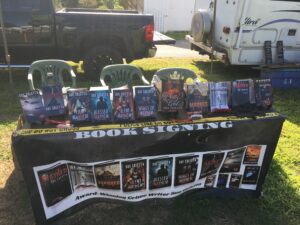 All book signings don’t need to be held in bookstores or libraries. I’ve had some of my most successful signings at local fairs and Old Home Days, and I’ve sold out and scored numerous book club invites.
All book signings don’t need to be held in bookstores or libraries. I’ve had some of my most successful signings at local fairs and Old Home Days, and I’ve sold out and scored numerous book club invites.
Readers love unique book signing venues.
I have a friend who held book signings in hospitals (pre-pandemic). Another friend held a book signing at a local brewery. Another friend has gained her local audience by hosting Florida wildlife cruises that end with a signing. See what I’m sayin’? Be creative!
A few years back, I held a signing at a murder site in one of my thrillers, which is also a popular tourist attraction. I’ve held a signing in a tattoo shop featured in the book. Some of my murder sites are places where I plan to hold signings once the book releases. And I’ve gained a supportive fanbase because of it. I’m lucky that my area is a popular tourist destination. Some fans literally run to my table, all excited to see me again. My husband, son, and daughter-in-law come just to watch readers’ reactions. My grandchildren (8 1/2, 7, and 4 y.o.) are far less impressed . . .
Nanna, why are all these people here to see you?
Because I’m cool.
Hahaha. No, really.
Out of the mouths of babes, right? Little rascals help to keep the ego in check.
Most importantly, book signings should be fun.
A book signing is a time when we get to meet the folks who love our characters, plot lines, twists and turns. Enjoy the day. Each time we sign a book it’s a personal experience between author and reader. The “right way” to sign a book is a personal choice. If it feels right to sign in crayon, go for it. The only part that’s a must is to adopt an author signature. Why invite trouble?
Over to you, TKZers. Did I miss anything? Do you cross out your name? Use colored ink? Doodle little hearts around the title? Please explain.
If you haven’t done a book signing yet, which of these tips might you adopt and why? Have you attended an unusual book event? Please explain.





 All book signings don’t need to be held in bookstores or libraries. I’ve had some of my most successful signings at local fairs and Old Home Days, and I’ve sold out and scored numerous book club invites.
All book signings don’t need to be held in bookstores or libraries. I’ve had some of my most successful signings at local fairs and Old Home Days, and I’ve sold out and scored numerous book club invites.

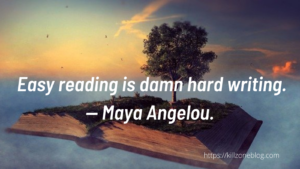 I always write to music, but a problem arose recently that made me question my writing ritual.
I always write to music, but a problem arose recently that made me question my writing ritual.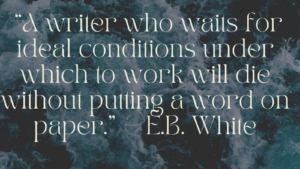 By switching to Pandora, not knowing what song would play or when, my brain couldn’t interpret the music as white noise.
By switching to Pandora, not knowing what song would play or when, my brain couldn’t interpret the music as white noise.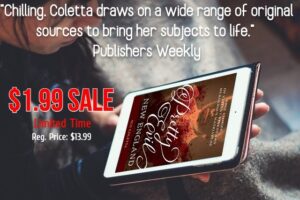
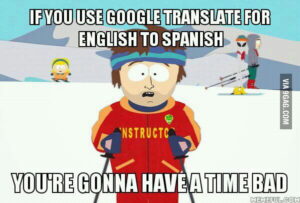 [Side note: English is a particularly difficult language for non-native speakers to learn because it’s full of inconsistencies and contradictory rules. If you didn’t learn English as a first language, please accept my condolences for the misery you’re going through.]
[Side note: English is a particularly difficult language for non-native speakers to learn because it’s full of inconsistencies and contradictory rules. If you didn’t learn English as a first language, please accept my condolences for the misery you’re going through.]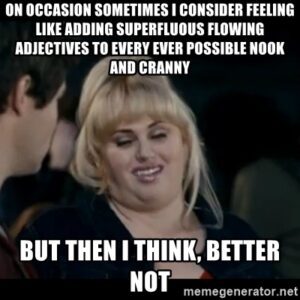
 Recently I learned that new lesson when TKZ regular Chuck sent me an interesting article that quotes
Recently I learned that new lesson when TKZ regular Chuck sent me an interesting article that quotes 
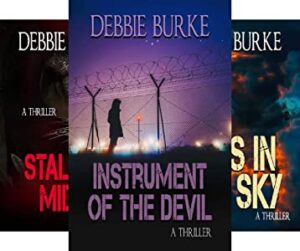
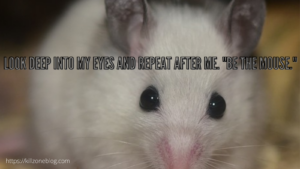 But it’s not as simple as that, is it? Persistence can be grueling at times.
But it’s not as simple as that, is it? Persistence can be grueling at times.

 One of the most amazing things about being an author is mingling within the writing community. Writers, as I’m sure you’ll agree, are some of the most generous, supportive, and kind humans on the planet.
One of the most amazing things about being an author is mingling within the writing community. Writers, as I’m sure you’ll agree, are some of the most generous, supportive, and kind humans on the planet. Do you really need to point out a typo in a tweet? We’re all fallible. Smile and move on.
Do you really need to point out a typo in a tweet? We’re all fallible. Smile and move on. I admit, when I first joined Twitter, an automated message to greet my new followers seemed like a good idea. Let me set the record straight—they are never a good idea.
I admit, when I first joined Twitter, an automated message to greet my new followers seemed like a good idea. Let me set the record straight—they are never a good idea.




